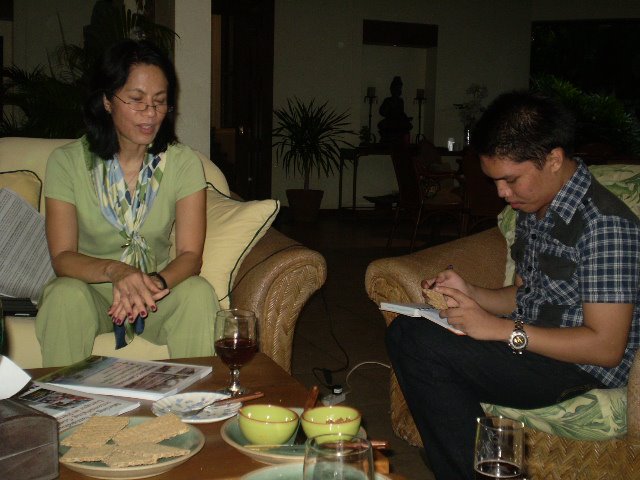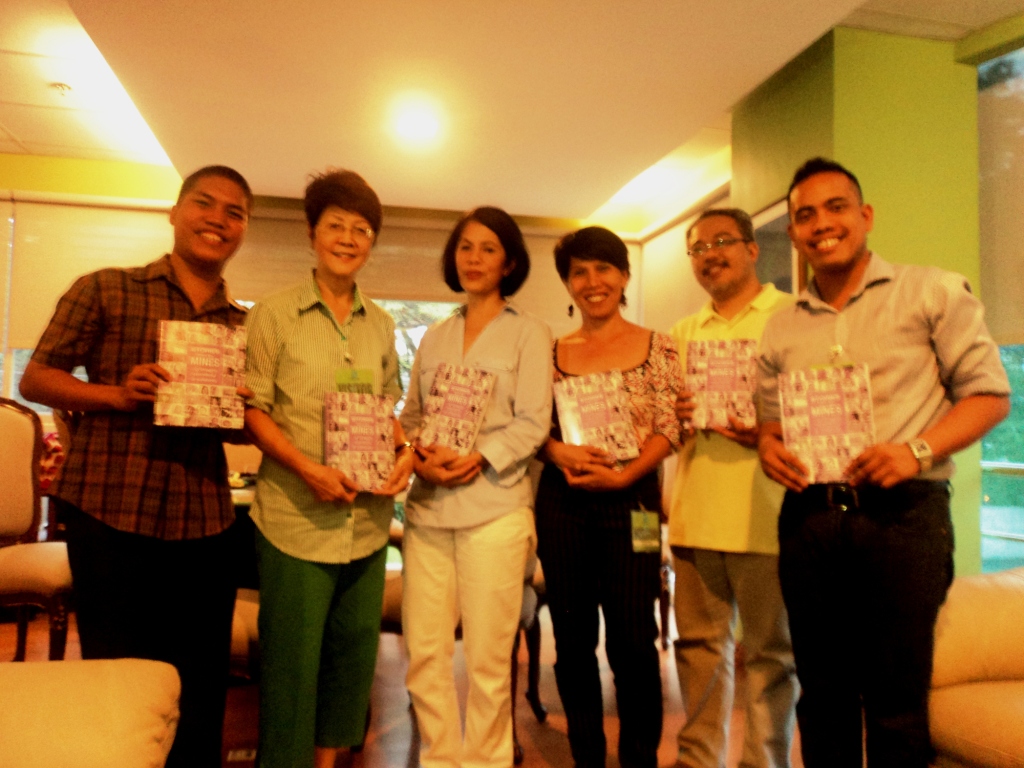Gina Lopez, anti-mining advocate
Renowned Filipina environmentalist Regina Paz Lopez still recalls the unique experiences she had during her missionary work in Africa during the 1980s. She remembers living in the slums, sleeping on the floor, falling in line to get water, and not having a toilet during those years of community immersion in nations such as Ghana, Kenya, and Tanzania.
“It gave me an exposure and appreciation of how poor people live and survive,” the managing director of ABS-CBN Foundation said during an interview at her Quezon City residence in early March. Lopez’ brainchild involves the television network’s long list of educational shows the past two decade as well as pioneering initiatives like the child welfare program Bantay Bata 163 and the advocacy group Bantay Kalikasan.
Clad in all-green attire and a floral-printed scarf, the 58-year-old Lopez explained that her pro-environment advocacy is linked to her spirituality. “You cannot love God without loving the environment. God is everywhere. You can see his hand in everything. From the plants to the stars,” Lopez said. At one point during the interview, the scion of the famed Lopez clan from Visayas excused herself to personally serve wine and wheat crackers to her guests.
Lopez is the lead convener of anti-mining group Save Palawan Movement, a multi-sectoral coalition of concerned environmental, legal religious and other civic groups that opposes mining activities in the said southern Luzon island province. The situation in the province gained national attention when radio broadcaster and staunch mining critic Gerry Ortega was shot to death in January 2011.

A few weeks after Ortega’s murder, Lopez together with Puerto Princesa City mayor Edward Hagedorn, “running priest” Fr. Robert Reyes, as well as pro-environment organizations like Alyansa Tigil Mina, Conservation International, Environmental Legal Asistance Center, Kalikasan People’s Network for the Environment, Philippine Tropical Forest Conservation Foundation, and many others launched the “No to Mining in Palawan” signature campaign.
The effort aims to get ten million signatures. This, according to the initiative’s website, aims to deliver a strong message to both the local government of Palawan and the national government that people oppose mining in Palawan and that they are standing up “to protect one of the Philippines’ last remaining treasures.”
Nearly seven million people have already signed the petition. Lopez considers this as her advocacy’s biggest accomplishment to date. According to her, it is a sign that Filipinos are finally taking a stand for the environment. “It’s an awakening of the people,” Lopez said.
“I feel that mining in the Philippines has been badly done the past 70 years,” Lopez said. She added: “There is no such thing as responsible mining in an island ecosystem. Companies should not break the beauty of agricultural places.” She also warned against the continued proliferation of large-scale mining operations in the provinces. ”Why don’t they clean up the mess they left in abandoned mining sites first? They have to prove to us that they are capable of rehabilitating those areas,” Lopez said. She cited Bagacay, Samar and Atok, Benguet as examples of these places.
Mining activities in the Philippines is currently governed by Republic Act 7942 or more commonly known as the Mining Act of 1995. Enacted during the term of then-President Fidel V. Ramos, the law gave the government the right to grant different types of mining rights to interested entities, including foreign ones. In January 2004, the Supreme Court struck down certain provisions of the law for allowing 100% foreign-owned companies to engage in mining in the Philippines.
The 1987 Philippine constitution bars fully-foreign owned entities from doing business in the country. The high court reversed itself eleven months later, citing the potential of role of mining in the nation’s economic progress. Gloria Macapagal-Arroyo, the Philippine president at that time, is a known proponent of mining. Efforts to have the 1995 mining law amended or repealed are still pending before the Congress.

Going up against mining giants have proved to be the most daunting challenge for Lopez’ advocacy work. A week before this interview, Lopez had a heated argument with Manuel Pangilinan, owner of TV5 broadcast network and chairman of PhilEx mining, the largest mining firm in the country. The exchange was caught on national television. Lopez disputed the claim made by mining entities in a full page newspaper ad last March that they have collectively paid billions of pesos in taxes to the government.
“For all these billions, what do we get in return? Think about the damage done by mining corporations to our biodiversity, to agriculture, and to the health of those living in the area. They don’t pay for these damages,” the woman who called herself the “worst nightmare” of large-scale miners pointed out. Despite her high visibility in environment activism, Lopez said that she has never received any death threats because of her work.
According to an April 2012 study released by the Philippine National Statistical Coordination Board (NSCB), mining and quarrying contributed just 2.7 percent to the economy of this Southeast Asian nation from 1998 to 2010. The average annual employment in the said industry for the same period is 130,000, or just 0.4 percent of the total employment in the country.
She also rebutted the argument that mining helps solve poverty. “Wherever large-scale miners go, the communities are damaged. They remain poor. The so-called economic benefits do not benefit the people,” Lopez said, stressing that large-scale mining is not labor-intensive because its operations are automated. “Mining does not translate to community development. We don’t need these investors. They only rape the country,” Lopez declared.
Lopez, who starts her day by meditating, works in close contact with fellow environment advocates. During the course of this interview, two environmentalists were waiting for their turn to speak to Lopez regarding their activities in Sibuyan, Romblon, where a number of mining operations are taking place.
She also read a complaint from a concerned citizen about the mining activities in Rapu-Rapu, Albay. “What the miners do to nature is very gruesome. I visit mining places and I see huge holes everywhere and red liquid flowing to the sea. Awful!” she said. She then showed a video of a polluted waterway in Compostela Valley.
Lopez referred to greed and selfishness as the biggest obstacles in her environment advocacy. She also cited the need for a “paradigm shift” in how Filipinos value the nation’s biodiversity. “At the end of the day, they have to face the reality. What difference are these mining companies causing them?” Lopez said.
The key to fighting mining, according to her, is to show people that there is another way of earning without damaging the environment. She suggested further boosting eco-tourism on one hand while promoting local products on the other as an alternative. She is not hesitant to use her family’s media conglomerate to push for these advocacies, reiterating repeatedly that “(her) strength is marketing.” Lopez added: “People do not have to risk their lives in mining.”
Lopez does not see herself taking a backseat in the fight against mining anytime soon, saying that she “will always have the love for the environment.” She added: “I am in a position to make a difference.” She said she’ll only be able to say ‘mission accomplished’ once all Filipinos “have taken a truly environmental stand.”
As the 2013 national election approaches, Lopez urged Filipinos to vote only for politicians who care for the environment. “We have a beautiful country. Let’s not allow greed and selfishness to rape it,” Lopez exhorted her countrymen. Lopez’ unrelenting passion for her advocacies underscore the fact that the task of defending the environment never ends. #
*A condensed version of my article can be read in the book Story from the Mines – Of Struggle, Sisterhood, and Solidarity by Alyansa Tigil Mina and Haribon Foundation (Quezon City, 2012)







I wonder if we can totally get rid of mining. The metals mines produce are raw materials of a wide range of things that a modern society needs. Is the thing called “sustainable mining” possible?